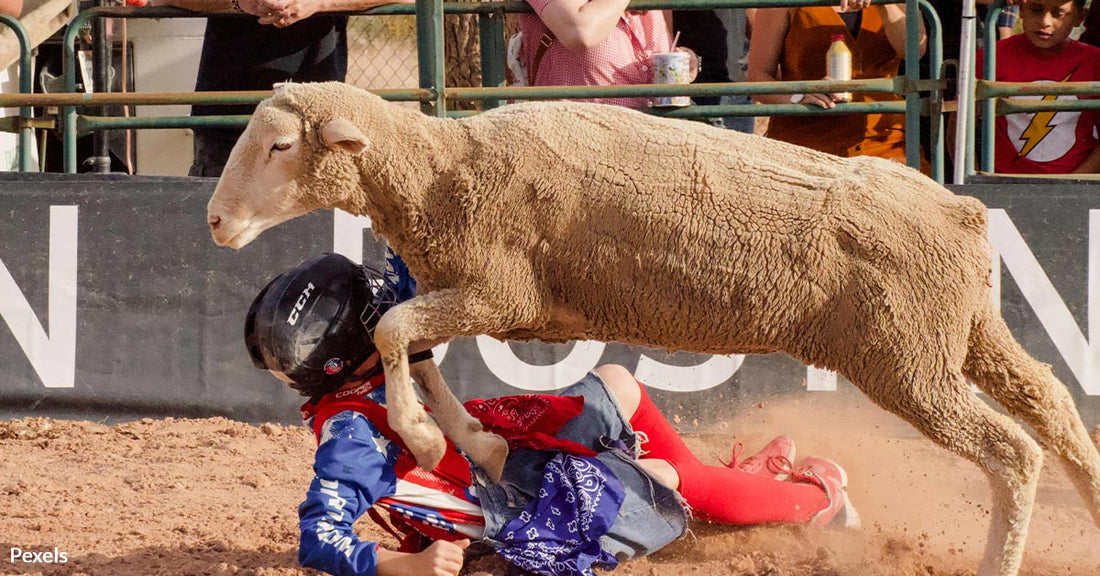Animal Rights Activists Demand End to Barbaric Sheep Riding Events at Manitoba Fair
Matthew Russell
Mutton busting, a popular event at rodeos and fairs across North America, is under increasing scrutiny from animal rights groups who claim the practice exploits and endangers young sheep.
As more people become aware of animal welfare issues, events like mutton busting, where children as young as five ride sheep in a rodeo-style format, are being questioned for their ethical implications.

What Is Mutton Busting?
Mutton busting involves children clinging to the backs of sheep as they race around an enclosed arena. The goal is for the child to hold on as long as possible before falling off. While it may appear to be harmless fun, animal rights advocates argue that the sheep involved are subjected to unnecessary stress and fear.
According to the Winnipeg Humane Society and Animal Justice, the sheep are often young and vulnerable, making them especially susceptible to injury during these events. These groups argue that putting animals in situations where they experience fear for the sake of entertainment violates their rights and welfare.
In particular, the animals often exhibit signs of distress, such as attempting to flee or struggling to free themselves from the children gripping their wool and ears. Experts note that these are clear indications of fear and discomfort, which should not be disregarded.

Criticism From Animal Rights Groups
In recent years, animal rights organizations have intensified their efforts to put an end to mutton busting. At the Royal Manitoba Winter Fair, both the Winnipeg Humane Society and Animal Justice have called for a stop to the event, along with other similar practices such as calf scrambles. They argue that these events exploit young animals, causing them distress and putting them at risk of injury.
"Mutton busting and calf scrambles are exploitative events that cause juvenile animals to experience fear and distress as they're chased around a brightly lit, unfamiliar arena," Brittany Semeniuk, an animal welfare specialist with the Winnipeg Humane Society, told the Winnipeg Sun.
The concern is not limited to physical injury but also encompasses the psychological harm inflicted on the animals. Sheep and calves, not accustomed to such environments, can experience anxiety and panic, which can have lasting effects on their well-being. As QCountry FM reports, the events in question could violate Manitoba's Animal Care Act, making them unlawful.

Supporters Defend Mutton Busting
Despite the growing opposition, proponents of mutton busting argue that the events are a cherished part of agricultural fairs and rodeos, offering children a chance to engage with rural life. Mark Humphries, general manager of the Provincial Exhibition of Manitoba, defended the Royal Manitoba Winter Fair’s barnyard challenge, which includes mutton busting, as an opportunity for children to learn about farm life.
v"We're trying desperately to make sure that disconnects [between urban and rural communities] are halted and reversed through our educational practices here," Humphries told CBC News. He added that the events do not involve wrestling or tackling animals and that the animals are familiarized with the arena before the show begins.
According to organizers, the event is intended to simulate common farm tasks, such as herding or haltering sheep, and is presented as an educational experience. Humphries also emphasized that animal care standards are strictly followed, and the chief veterinary officer is present to ensure that all practices align with provincial animal welfare regulations.

Is It Time to End Mutton Busting?
Animal rights advocates remain unconvinced. Critics argue that rebranding the events as educational does not eliminate the inherent risks to the animals involved. Mutton busting continues to draw comparisons to other outdated rodeo practices, like bullfighting, which have been banned in many areas due to concerns over animal cruelty.
Kaitlyn Mitchell, a lawyer with Animal Justice, told the Winnipeg Free Press that laws like Manitoba’s Animal Care Act are in place to protect animals from unnecessary suffering, and mutton busting violates these protections.
"Federal and provincial laws are clear: It's illegal to cause distress and suffering to animals in the name of entertainment," Mitchell said.
As more events like these come under the microscope, there is growing pressure to ensure that all practices involving animals are humane and ethical. Advocates hope that their efforts will lead to the end of events like mutton busting and calf scrambles in the future.

A Tradition in Question
The debate over mutton busting is part of a larger conversation about the role of animals in entertainment. While some view it as a harmless and educational experience for children, others see it as an outdated practice that inflicts unnecessary stress and harm on animals.
As, the debate continues, you can help us support the side of animal welfare advocates pushing for stronger protections and humane alternatives to these controversial practices. Click below and take action for animals in need.

